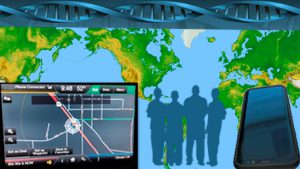Introducing “Precision” to the CDC Genomics and Health Impact Update and the Public Health Genomics Knowledge Base
Posted on by For many years, the CDC Office of Public Health Genomics has published the Genomics and Health Impact Weekly Update with the latest information and publications about the real-world impact of genomics on medicine and public health. More recently, we added a second feature to our weekly update, the Advanced Molecular Detection (AMD) Clips, highlighting the role of pathogen genomics and molecular technologies in the investigation and control of infectious diseases. As of today, we will add a third component to our weekly update, the topic of “precision health.” So what is precision health and how is it different from genomics?
For many years, the CDC Office of Public Health Genomics has published the Genomics and Health Impact Weekly Update with the latest information and publications about the real-world impact of genomics on medicine and public health. More recently, we added a second feature to our weekly update, the Advanced Molecular Detection (AMD) Clips, highlighting the role of pathogen genomics and molecular technologies in the investigation and control of infectious diseases. As of today, we will add a third component to our weekly update, the topic of “precision health.” So what is precision health and how is it different from genomics?
The word “precision” has become firmly established in the modern biomedical research enterprise. As described by the NIH All of US Research Program, “precision medicine” is a novel approach
“Precision public health is about using the best available data to target more effectively and efficiently interventions of all kinds to those most in need.”
to treatment and prevention that takes into account differences in lifestyle, environment, and biology. Precision medicine starts with the individual. Precision medicine has a firm foundation in genomics, and other ‘omic’ fields. More recently, the term “precision” has made its way to the realm of public health. For some, the term precision medicine is used interchangeably with genomic medicine, and precision public health is viewed as the applications of precision medicine in populations. We think there is a bigger role for precision in measuring health and disease beyond genomics. Precision public health is about using the best available data to target more effectively and efficiently interventions of all kinds to those most in need. Increasingly, a large volume of health and non-health related data from multiple sources is becoming available and has the potential to drive implementation of evidence-based practice.
Precision in both medicine and public health (which we shortened to “precision health”), comes from an abundance of “big data,” a term used for large data sets that include biomarkers, sociodemographic, environmental, and other types of information. Big data comes from many sources of people, places, and time, such as digital biomarkers, online apps, social media, geographic information systems, and electronic health records, among others. Big data can help to refine analyses of the burden and causes of disease distribution and the gaps in implementing evidence-based interventions. Big data requires new approaches to complex analysis including, machine learning, predictive analytics, and artificial intelligence. These terms are often used loosely and interchangeably hinting that the merger of information from many areas can lead to more precision in measuring health and disease outcomes, well beyond genomics. Nevertheless, our expectations for big data to lead to precision health depend on the conduct of rigorous studies to evaluate the validity and utility of these novel approaches in improving health and preventing disease in populations.
Thus, in our new weekly update, we will explore developments in precision health beyond genomics. (We already capture and display studies that feature the use of human and pathogen genomics, whether or not they use other types of environmental information.) We will be scanning for the emerging science that eventually will contribute to the overall vision of precision public health.
Our staff will select publications and information from CDC and other studies that
- integrate measurements from complex data sets on persons, place, or time; or
- use advanced analytic methods to seek more precision in risk assessment, prevention, diagnosis, and treatment; surveillance, monitoring and public health assessment; and development, implementation, and evaluation of evidence-based policies and programs.
Thousands of people view our weekly update. It forms the foundation of our Public Health Genomics Knowledge Base (PHGKB), an online, continuously updated, searchable database of published scientific literature, CDC resources, and other materials that address the translation of genomic discoveries into improved health care and disease prevention. PHGKB is regularly updated to reflect ongoing developments in the field. This compendium of databases can be searched for genomics-related information on any specific topic and contains original research articles on translation and implementation into practice, as well as guidelines, evidence, tools, and programs, in addition to CDC and NIH information. PHGKB’s popularity has been steadily growing. In 2018, PHGKB was accessed more than 1 million times.
To summarize, our website users will immediately see that
- the weekly update has been renamed to the Genomics and Precision Health Weekly Update,
- a new category of information and publications, Non-Genomic Precision Health, has been added, and
- PHGKB has been renamed to the “Public Health Genomics and Precision Health Knowledge Base” (but we will keep the acronym PHGKB)
We invite our readers to share feedback on these changes and the types of articles and information they find relevant for research, practice, and general education.
Please submit your comments here.
Posted on by


